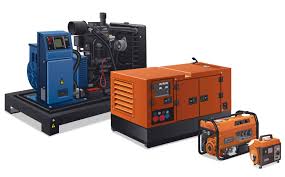Commercial Generators

What would happen to your business in the event of a power outage? Would it remain productive, or would business grind to a screeching halt? Adding a power generator to your commercial location can prevent lost customers and gaps in productivity resulting from short- or long-term power losses due to weather, accidents, and more.
What Is a Power Generator?
A power generator independently provides a backup source of electricity in the event of a power outage. Similar to an automobile, a generator creates mechanical energy with the help of a heavy-duty recharging battery to initiate and maintain energy, a fuel tank to supply fuel (gasoline, diesel, or natural gas), an engine, and an alternator to convert that mechanical power into electrical power. Having a standby generator will ensure that your operation never has to experience downtime. With a generator standing by, if your area’s electrical supply fails, the commercial generator will provide a seamless transition to backup power.
Power generators are useful to businesses in many ways:
- Generators ensure continued productivity in the event of a power outage, keeping necessary appliances in operation.
- Generators ensure the safety and comfort of your employees during the event of a snowstorm, ice storm, or heat wave.
- Generators help protect computer data and allow security systems to continue to function.
- Generators provide an uninterrupted supply of power, despite brownouts and outages, keeping all devices running like normal.
Types of Commercial Power Generators
Portable Generators
Portable commercial generators may be wired into a subpanel by an electrician or simply plugged into appliances using extension cords. They power only chosen essentials such as lights, refrigerators and some computers. They are a simple and inexpensive backup power option but must be started manually. They offer a limited supply of electricity, providing enough power for two to four outlets or a few specific circuits when wired in. These generators must be located at least 10 feet away from your business, away from doors and windows, and in a completely open area (not even carports or awnings are safe) to avoid carbon monoxide poisoning.
Standby Generators
Standby generators start automatically during power outages, preventing interruptions in electrical service. They are powered by natural gas or propane, are quieter than portable models, and can run everything in your business location. They come at a higher price than portable power generators and also require additional installations by a qualified electrician, including a transfer switch, a subpanel, and the power generator itself.
Potential Problems
Just like any other engine, standby generators require periodic service and maintenance. Below are the most common reasons you may need to call an electrical technician to service your commercial generator:
- Battery Failure
This is the single most common cause for power generator service. Battery failure may be the result of sulfate buildup on the battery terminals, shorts, open cells, a tripped charger breaker, charger failure, or simply loose or dirty connections. - Low Coolant
External and internal coolant leaks, clogged radiators, and more can cause a power generator to run hot and shut down. - Faulty Block Heater
Because they run so frequently, block heaters often become faulty, resulting in a low coolant temp alarm. - Wet Stacking
Excessive no-load run time can result in an over-fueled engine that becomes damaged due to the accumulation of carbon particles, unburned fuel, oil, condensed water, and acids in the exhaust. - Controls Not in “Auto”
This simply means the power generator was not shut off and may not be the main control switch. This can be due to human error, open breakers, alarms or switchgear not properly reset, emergency shutdown, and more. - Air In the Fuel System
When a generator does not run on a regular basis, air can enter the fuel lines and prevent injectors from firing. This issue can be prevented with weekly inspections. - Out of Fuel
Generators will automatically shut down when fuel depletion is imminent to prevent the fuel system from drawing in air. - Breaker Trip
If no one has accidentally pushed the emergency shut-off, check the status of the automatic transfer switch (ATS). Never try to manually operate this switch if you do not know how to do so, as it could result in severe injury or death.
Warning! Never plug your generator into a wall outlet. This is known as backfeeding. If you do this without turning off the main breaker to isolate your business from the grid, you could send power back on into the grid, potentially injuring or killing utility repairmen.
Double can inspect your commercial generator. We would do a thorough, professional inspection keeps you safe and ensures all local codes and regulations are met.
Professional Generator Installation
A professional can determine the right size of generator for your needs.
Do you know how to properly calculate wattage so that your system isn’t overloaded at startup? This varies depending on the equipment you need to power and the manufacturer of your generator. Our professionals have the skills necessary to calculate power needs for a smooth operation.
Professional installation ensures safety.
A professional electrician can safely set up wiring, plugging your generator into the transfer switch and wiring it directly to your business’s service panel. This disconnects you properly from the grid and ensures the safe delivery of power only to designated circuits, preventing the overloading of your generator, backfeeding, fire, and other safety issues. Proper positioning and installation of your portable generator is also essential in preventing carbon monoxide poisoning.
[Form id=”3″]

